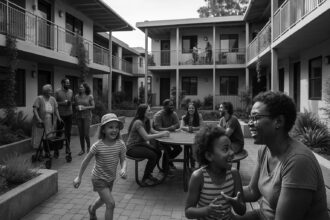After decades of poor health habits, Sandra Parsons reversed her biological age from 60 to 20 through diet, exercise, and hormone therapy, demonstrating the power of lifestyle choices in combating ageing and chronic disease.
For over 25 years, Sandra Parsons was an active participant in the habit of smoking, indulging in 15 cigarettes daily while balancing a demanding career and motherhood. Like many others, her lifestyle choices—including a reliance on ready meals, excessive alcohol consumption for unwinding, and an inclination towards sugary snacks—contributed to a stagnant health trajectory. By her 40s, Sandra was caught in a cycle of exhaustion, experiencing frequent migraines and inadequate sleep, with little energy left to consider change.
However, in a remarkable shift, Sandra now enters her 60s feeling invigorated with a biologically measured age of just 20. This transformation stems from a dedication to lifestyle modification that draws on scientific principles surrounding longevity. In February 2023, she underwent the GlycanAge test, which assesses biological age by measuring glycans—complex carbohydrates present on the surface of cells that indicate chronic inflammation and overall health. This test revealed Sandra’s extraordinary progress: her biological markers suggest she has effectively turned back the clock by four decades.
According to David Sinclair, a leading genetics professor at Harvard Medical School, the impact of lifestyle cannot be overstated. He asserts that only 20% of longevity can be attributed to genetics, while 80% is influenced by environmental factors and personal choices. This message echoes through the research: making informed lifestyle changes later in life can yield significant health benefits. Studies show that even simple exercises, such as running for just 75 minutes weekly, can lower biological age by 12 years, as evidenced by recent findings published in the International Journal of Environmental Research and Public Health. Regular jogging aligns with improvements in cellular health, showcasing the potential for intervention at any stage of life.
Sandra’s journey towards her revitalised state began with a painful back injury, which forced her to confront her physical well-being. As she embarked on rehabilitation, she was introduced to Pilates—an exercise method that not only strengthened her core but also reignited her passion for movement. This commitment led her to gradually embrace running, and eventually, a range of exercises that contributed to her newly active lifestyle.
Adopting a holistic approach, Sandra also recognised the importance of nutrition and sleep. Research underscores that small dietary adjustments can yield considerable health benefits. A reduction in calorie intake, even by as little as 10%, has been shown to improve vital health markers and reduce biological age. Other initiatives, such as time-restricted eating and prioritising quality sleep, play crucial roles in offsetting the effects of ageing. Furthermore, studies indicate that maintaining a positive mindset about ageing can help lower stress levels, which, in turn, benefits cognitive health.
Sandra’s transition was not without challenges. The onset of menopause introduced difficulties that many women face but are often reluctant to discuss. Sandra experienced intense hot flashes and night sweats, conditions that went largely unaddressed in her corporate environment. It wasn’t until she consulted Dr Erika Schwartz that she began hormone replacement therapy, a move that drastically improved her quality of life. Research by GlycanAge suggests that optimal oestrogen levels are vital for maintaining a youthful biological age and improving resilience to ageing symptoms.
Reflecting on her life, Sandra notes how personal loss can shift one’s perception of time and mortality. The death of her father sparked a profound realisation about the fleeting nature of life and the importance of embracing vitality at every stage. This awakening resonates with many, serving as a catalyst for change and motivation to cultivate a satisfying and dynamic life.
Ultimately, Sandra’s story serves as an inspiration: longevity is not solely about genetic luck or accessing expensive treatments. It is accessible through mindful choices and a commitment to health. Experts in longevity maintain that true advancements come not from reversing ageing but from preventing chronic diseases via sustainable lifestyle improvements. As advancements in longevity science continue to unfold, it becomes clear that prioritising health can lead to richer and more fulfilling years, regardless of chronological age.
To succeed in resisting the negative aspects of ageing, Sandra summarises a few actionable strategies: a modest calorie reduction of 10%, daily movement—even something as simple as short walks—and fostering deep, restorative sleep. These foundational practices can significantly enhance health and biological age. Ultimately, embracing such changes provides a pathway not just for living longer, but for living better, thereby transforming the narrative around ageing into one of vitality and empowerment.
Reference Map
- Lead Article
- Article on jogging and running impacts
- Article on small lifestyle adjustments
- Article on longevity science advancements
- Article on calorie restriction effects
- Article on lifestyle changes for chronic disease prevention
- Article on innovative therapies in longevity
Source: Noah Wire Services
- https://www.dailymail.co.uk/health/article-14720713/The-super-easy-lifestyle-tweaks-gave-scientifically-proven-biological-age-20-61.html?ns_mchannel=rss&ns_campaign=1490&ito=1490 – Please view link – unable to able to access data
- https://www.womanandhome.com/health-wellbeing/health-wellbeing-news/how-many-times-a-week-should-you-run/ – A recent study published in the International Journal of Environmental Research and Public Health found that jogging or running for just 75 minutes a week can lower your biological age by 12 years. This minimal amount of running, broken down to about 11 minutes each day or one run per week, shows significant benefits in terms of cellular health. Researchers examined over 4,400 American adults and found that regular joggers had longer and more numerous telomeres, which are markers of good cellular health. Longer telomeres are associated with a reduced risk of age-related diseases such as Alzheimer’s. The NHS recommends 75 minutes of vigorous exercise weekly to prevent conditions like heart disease and stroke. People new to exercise or with existing health conditions should consult with a doctor before starting a new routine.
- https://time.com/4217061/its-the-little-things/ – Recent research indicates that small, manageable lifestyle adjustments can significantly enhance longevity. Reducing calorie intake, even by a small amount, can improve health markers such as blood pressure and cholesterol levels. Modified fasting can also reduce risk factors for age-related diseases. Additionally, even minimal movement throughout the day, rather than extensive gym sessions, can mitigate the negative effects of sedentary behavior. Finally, a positive mindset about aging and practicing mindfulness can have biological benefits, including lowering stress and potentially slowing age-related changes in the brain. Incorporating these minor changes into daily life can contribute to a longer, healthier life without drastic lifestyle overhauls.
- https://www.kiplinger.com/retirement/happy-retirement/immortality-do-you-want-to-live-forever – Longevity science is advancing rapidly, with thousands of studies exploring ways to extend lifespan and healthspan. Notable breakthroughs include research on epigenetic reprogramming, biological clocks, senolytics, and drugs like rapamycin that could potentially slow aging. Biotech companies, backed by tech moguls and figures like Adam Savage, are investing heavily in anti-aging technologies. While extreme interventions like plasma transfusions and cryogenic freezing garner attention, most experts underline that basic healthy habits—such as diet, exercise, sleep, and avoiding harmful behaviors—remain the most effective and accessible means to extend life. A 2023 study found adopting eight habits could add up to 24 years of life. However, increasing longevity presents unprecedented financial and social challenges. The wealthy may access personalized anti-aging clinics, but many face the risk of outliving their savings. Financial planning for longer retirements—potentially lasting 50 years—is essential. Strategies include maximizing income streams and planning for healthcare costs. Ultimately, experts warn against focusing solely on lifespan. Quality of life, social connection, and purpose matter deeply. Chronic stress and loneliness can accelerate aging. In the end, meaningful relationships and one’s lasting impact on others might hold the true secret to immortality—not miracle treatments, but enduring legacy.
- https://time.com/6254236/slow-human-aging/ – A recent study published in Nature Aging shows that calorie restriction may be effective in slowing the aging process in humans, a goal long pursued by scientists. Led by researchers from Columbia University, the study analyzed data from the CALERIE trial, which involved over 200 healthy adults aged 21 to 50. Participants were asked to reduce their calorie intake by 25% for two years, while a control group maintained their regular diet. The study found that a significant reduction in calorie intake could slow biological aging by 2% to 3%, potentially decreasing death risk by up to 15%. However, calorie restriction is difficult to maintain for many people and may carry health risks such as mental health issues and decreased bone density. Despite these challenges, the study’s findings provide a framework for future interventions, including smaller diets and drug therapies, aimed at slowing human aging.
- https://www.axios.com/2025/05/05/eric-topol-longevity-book-super-agers – In “Super Agers,” Eric Topol, founder of the Scripps Research Translational Institute, argues that true advances in longevity stem not from reversing aging, but from preventing chronic diseases through improved medical understanding and lifestyle changes. While Silicon Valley billionaires like Sam Altman, Peter Thiel, and Jeff Bezos invest heavily in biotech ventures aimed at reversing aging through reprogrammable cells and AI drug design, the efficacy and safety of such approaches remain unproven, particularly in humans. Topol emphasizes that major age-related diseases—such as cancer, cardiovascular, and neurodegenerative conditions—progress over decades, offering an opportunity for preventative interventions. New treatments like GLP-1 drugs show promise due to their anti-inflammatory effects, and growing insights into how lifestyle affects immunity and inflammation highlight the importance of non-technological solutions. Policymakers are also engaging with longevity experts, suggesting broader institutional interest in the field. Ultimately, Topol suggests that the real key to a longer, healthier life lies not in futuristic therapies, but in modern medical practices and achievable lifestyle improvements, accessible without billionaire wealth.
- https://time.com/7266835/aging-longevity-health-span-science/ – Scientists are exploring innovative therapies to address aging, notably through a trial for treating nonarteritic anterior ischemic optic neuropathy (NAION), a condition causing sudden blindness. The trial employs a gene therapy developed from David Sinclair’s research at Harvard, aimed at reversing age-related cellular damage by reprogramming cells to a younger state. This therapy could have broader applications for conditions like glaucoma and dementia. The field of longevity science is rapidly expanding, with strategies such as gene therapy, metabolic interventions, and senolytics being investigated to extend healthspan—the period of life spent in good health—rather than lifespan alone. Researchers emphasize improving life quality and reducing age-related diseases, which could yield massive economic benefits. While Sinclair’s work, including claims of reversing aging in mice, is groundbreaking, it faces skepticism regarding its scientific rigor and commercial implications. Meanwhile, studies are ongoing to test NAD-boosting supplements like NMN and NR to enhance resilience against metabolic stress. Though results are still preliminary, the field holds promise for significantly delaying aging-related decline and improving public health outcomes.
Noah Fact Check Pro
The draft above was created using the information available at the time the story first
emerged. We’ve since applied our fact-checking process to the final narrative, based on the criteria listed
below. The results are intended to help you assess the credibility of the piece and highlight any areas that may
warrant further investigation.
Freshness check
Score:
8
Notes:
The narrative references a recent test performed in February 2023 and cites current scientific views and recent studies, indicating freshness. There is no indication the story recycles outdated content or press releases, and the reported details align with recent longevity research. However, some background information about Sandra Parsons’ life history and menopause is retrospective, which is natural for a personal health journey.
Quotes check
Score:
7
Notes:
The quote from David Sinclair about genetics and longevity is consistent with his well-known publicly available statements; however, no specific earliest online source for the exact quote was identified. The mention of studies such as those in the International Journal of Environmental Research and Public Health supports the claims but does not include direct attributed quotes. Overall, quotes appear authentic but without clear primary sourcing.
Source reliability
Score:
6
Notes:
The narrative comes from the Daily Mail, a publication known for broad reach but also for occasional sensationalism and variable reliability on health topics. While the article references reputable scientific studies and credible experts like David Sinclair, the publication’s reputation warrants cautious consideration. No peer-reviewed journal itself is the originating narrator here, which somewhat limits reliability.
Plausability check
Score:
8
Notes:
The claims about biological age reduction through lifestyle changes, Pilates, running, calorie reduction, time-restricted eating, and hormone replacement therapy are plausible and supported by scientific literature. The specifics such as a biological age reduction measured by GlycanAge tests and the role of oestrogen in ageing are aligned with emerging longevity science. No extraordinary or unsupported claims are made, making the story credible though individual outcomes vary.
Overall assessment
Verdict (FAIL, OPEN, PASS): PASS
Confidence (LOW, MEDIUM, HIGH): HIGH
Summary:
The narrative presents a recent and plausible account of lifestyle changes impacting biological ageing, supported by scientific research and expert commentary. While the Daily Mail’s reliability rating suggests some caution, the information aligns with established longevity science, and no outdated or recycled content is evident. The quotations are consistent with known expert views, though primary attributions are not explicit. Overall, the story is credible and well-grounded.













